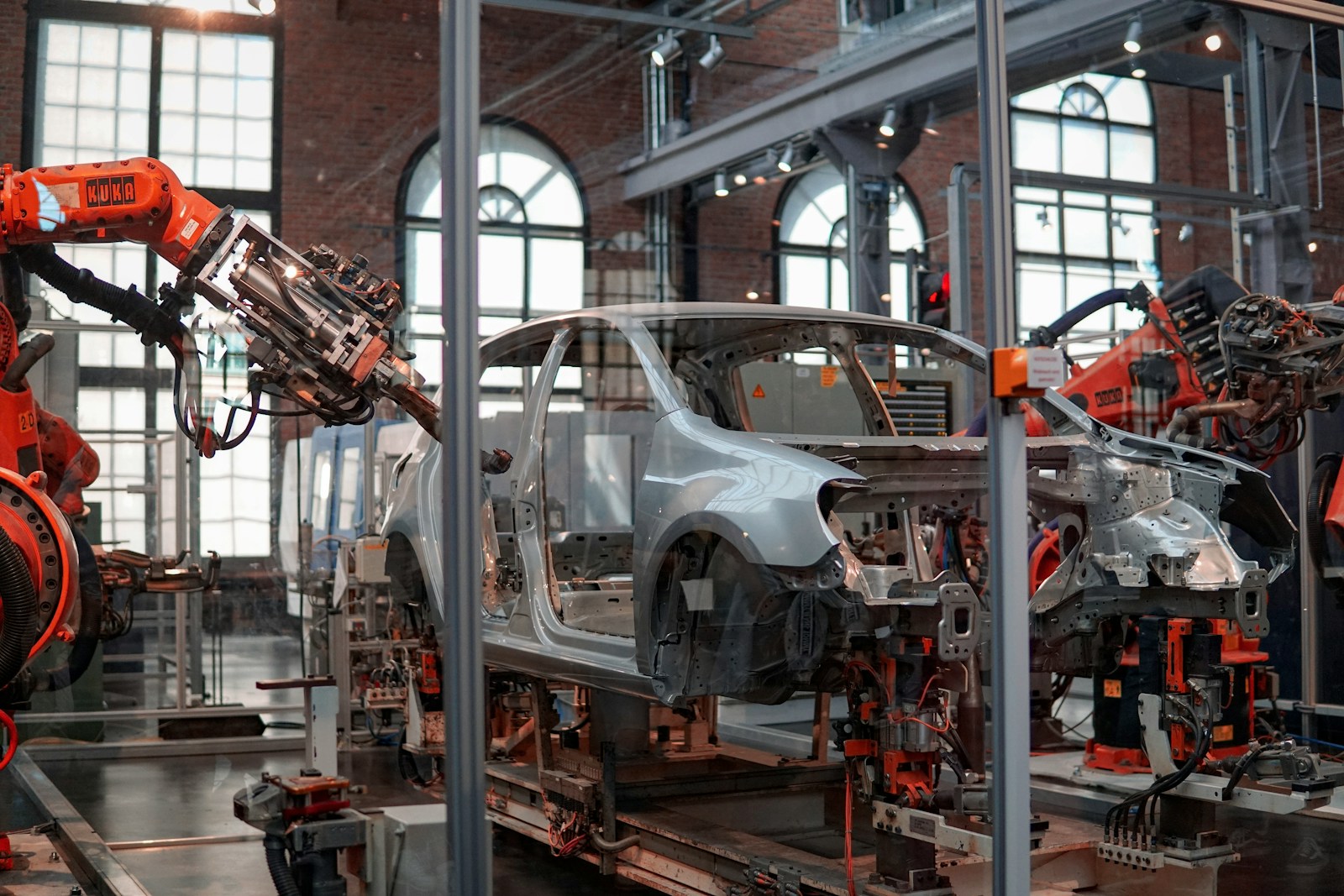In the ever-evolving landscape of automotive manufacturing, the integration of Artificial Intelligence (AI) stands out as a transformative force shaping the future of the industry. As we look ahead to 2024, it’s clear that AI’s influence is poised to redefine automotive production, design, and functionality, driving efficiency, innovation, and sustainability to new heights. This blog post explores the multifaceted impact of AI on automotive manufacturing, spotlighting key trends, challenges, and opportunities that define this exciting frontier.

The Advent of AI in Automotive Manufacturing
AI’s journey into automotive manufacturing marks a pivotal shift towards smart factories, where technology and automation converge to create a more agile, intelligent production environment. The adoption of AI technologies has accelerated, driven by the automotive industry’s relentless pursuit of excellence in efficiency, quality, and safety. As we advance into 2024, AI’s role is expanding beyond automation to encompass predictive analytics, machine learning (ML), and advanced robotics, reshaping the manufacturing landscape.
Transforming Production Lines
One of the most significant impacts of AI on automotive manufacturing is the transformation of production lines. Traditional assembly lines are being replaced by AI-driven systems capable of adaptive learning and optimization. These intelligent systems can predict equipment failures, reduce downtime, and adapt to changing production demands in real-time. For instance, predictive maintenance, powered by AI, can analyze data from various sensors to foresee machinery failures before they occur, significantly reducing unplanned downtime and maintenance costs.
Enhancing Quality Control
AI is setting new standards in quality control within automotive manufacturing. Through advanced imaging and machine learning algorithms, AI systems can detect and analyze defects with greater accuracy and speed than human inspectors. This not only ensures higher quality products but also reduces waste and rework, leading to more sustainable manufacturing practices. As we move into 2024, the integration of AI in quality control processes will continue to advance, leveraging deep learning to identify even the most subtle defects in complex automotive components.
Revolutionizing Design and Customization
AI’s impact extends beyond the factory floor into the realms of design and customization. Generative design, powered by AI, is revolutionizing automotive design by exploring millions of potential configurations to find the most efficient and innovative solutions. This approach enables designers to create vehicles that are lighter, more durable, and more energy-efficient. Additionally, AI-driven customization tools allow manufacturers to offer personalized options to customers, enhancing the buying experience and meeting the growing demand for bespoke vehicles.
Accelerating Supply Chain Optimization
The automotive supply chain, known for its complexity, is undergoing a transformation through AI’s capabilities in data analytics and machine learning. AI algorithms can analyze vast amounts of data from various sources to optimize logistics, inventory management, and supplier selection. This leads to more resilient supply chains, capable of anticipating disruptions and adapting to changes swiftly. As we approach 2024, AI-powered supply chain solutions will become increasingly critical in ensuring the seamless flow of materials and components essential for automotive production.
Driving Sustainability
Sustainability is a pressing concern in the automotive industry, and AI is at the forefront of addressing this challenge. AI technologies are enabling manufacturers to reduce waste, optimize energy use, and minimize the carbon footprint of production processes. For example, AI can optimize the use of materials in manufacturing, reducing waste and saving costs. Furthermore, AI-driven energy management systems can significantly reduce energy consumption in factories, contributing to the industry’s sustainability goals.
Navigating Challenges and Opportunities
The integration of AI into automotive manufacturing presents a myriad of opportunities but also poses significant challenges. One of the key challenges is the need for substantial investments in technology and talent. Manufacturers must invest in AI infrastructure and upskill their workforce to harness the full potential of AI technologies. Additionally, data security and privacy concerns necessitate robust measures to protect sensitive information.
Despite these challenges, the opportunities presented by AI in automotive manufacturing are vast. AI opens up new avenues for innovation, efficiency, and sustainability, driving the industry towards a more intelligent and environmentally friendly future. As we look ahead to 2024, the continued evolution and integration of AI technologies will undoubtedly shape the future of automotive manufacturing, heralding a new era of smart, sustainable, and highly efficient production.
Conclusion
The impact of AI on automotive manufacturing is profound, marking a significant shift towards smarter, more sustainable production practices. As we anticipate the advancements in 2024, it’s clear that AI will continue to play a crucial role in transforming production lines, enhancing quality control, revolutionizing design, optimizing supply chains, and driving sustainability. The challenges of integrating AI into automotive manufacturing are substantial, but the potential benefits in efficiency, innovation, and environmental stewardship are immense. The journey ahead is promising, with AI leading the way towards a more efficient, innovative, and sustainable automotive industry.
Nick is a dedicated auto writer with a deep passion for cars and a constantly evolving garage. As a true car enthusiast, he brings firsthand knowledge and excitement to his posts, offering readers a unique perspective on the latest trends and vehicles. Beyond his love for cars, Nick has a keen interest in real estate and enjoys indulging in clothes shopping. His weekends are often spent traveling the country in good company, exploring new places and making the most of his journey. Through his writing, Nick aims to share his love for the open road and inspire others to appreciate the thrill of driving.
